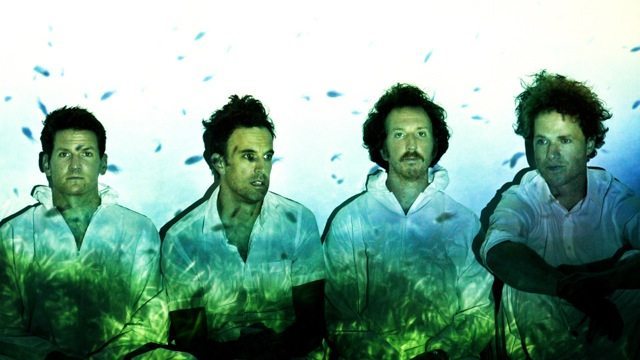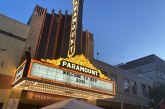Every time you pick up a new instrument you feel a whole new direction of inspiration. If you’ve got writer’s block, just start playing clavichord or something else out of left field. The truth is we didn’t even really know how to play the instruments we were playing, at first. Somewhere after three albums we all started branching out. Ryan started playing bass. I picked up the drum kit, and threw a lot of piano in there. Each album since, we’ve gotten further and further from our guitar roots.
-Brian Rosenworcel on Guster’s new album “Evermotion”
Guster has been touring in support of their music for well over 2 decades. Their debut album, Parachute, celebrated its 20th birthday last year. This coincided with the release of Evermotion, their seventh studio album. Guster began as a three-piece in 1991/92 when Rosenworcel picked up a pair of bongos to jam with fellow Tufts University students Adam Gardner, and Ryan Miller. Today, cuts from Evermotion feature four inspiring multi-instrumentalists with the addition of Luke Reynolds to the lineup. Evermotion also saw the band work under the production guidance of Richard Swift (The Black Keys, The Shins) at his Cottage Grove home.
BR: We were in his backyard in his home studio in Oregon. For the first time in a long time we gave ourselves over to a producer’s way of doing things. For many albums we took a year of butting heads with producers and with each other. We were perfectionists and sort of writing songs in batches, and second-guessing everything. On this record we went in and hammered out twelve songs, or whatever it was, and Richard helped us make great decisions. He was always listening to stuff, and stepping away from the canvas, and taking it all in. He made a lot of good big picture decisions for us, that, if left to our own devices, we wouldn’t have made for ourselves.
Under Swift’s direction the member’s of Guster have taken their insatiable appetite for new instruments to another level. They’re using more synths, ethereal sounds, and other clear signs of heavy studio production than albums past. But Swift’s effects can be heard more definitively in the structure of the album then anywhere else. The songs are still the same Guster, just as poignant yet simple as ever before. But the coherency of the album as a whole is unlike anything from the band to date. One might say it is a very mature album in comparison to its precursors. And that maturity is something that has continued to stress the heartbreaking estrangement many of the band’s earliest supporters had around the turn of the century when Rosenworcel first began experimenting with a true drum kit.
BR: The truth is we did it for creative reasons. I played bongos when I got to college because I just had a set of bongos and we were jamming in the dorm room. I had never played a drum kit in my life. So as we wrote songs that way, I kind of created this ‘all-infusive’ hand percussion kit. It evolved into something with snares and cymbals and was a spectacle, live, that helped us earn a more cult-like following. We all had this kind of boredom with that first kit. We knew we didn’t want to write another album like that, so I became a very mediocre stick drummer. It was a little bit humbling at first, because I couldn’t make my legs and arms do things in a coordinated fashion. But over time I became competent on it. I’m certainly not trying to emulate Stewart Copeland. I’m just trying to sit in the pocket the way Charlie Watts would. But a lot of people presumed that I started playing with sticks to save my hands, which were notoriously bloody. While a nice side effect of that decision is my hands are in good shape. Now the live show is a 50/50 blend of hands and sticks. There were a lot of people who were mad about it. We lost a lot of our fan base with that decision. You can’t really think twice about that kind of stuff. You just got to go with it. When I look back at our evolution, it’s one of the proudest parts for me.
If Rosenworcel is proud of his band’s natural evolution over the last two decades, then he must be ecstatic about the growth of their live show. Notorious for dressing up in costumes and opening up for their own concerts as a Guster cover bands’ Peace Soldiers or Trippin’ Balls, Guster has brought the “live” back to the live show. Their “live in the moment” style of antics has helped them earn notoriety for a concert, where just about anything can happen. One of their fans’ all-time favorites is an encore when Rosenworcel stepped out from behind the drum kit and sang his own rendition of Katy Perry’s “Firework”.
BR: (Laughter) I forgot I did that, and I only did “Firework” once, so you definitely dug deep for that one. I mean if the crowd hadn’t encouraged me I probably wouldn’t have done it. (Laughs) You get bored playing the same show every night the same way. It’s not like we let me sing every night. But, you know, once a week, sometimes once a tour, and it feels like you’re doing something special. I just go out there and I try to sing the notes. I try my hardest to sing them correctly and they come out… like that.
There are many reasons for Guster’s extended success. Catchy songwriting, relatable anthems, and simple direction have taken them a long way. But when you hear Rosenworcel discuss those more humble days of music making, it becomes clear that Guster’s fans are the ones who really gave the band life.
BR: There weren’t a lot of models for having a local fan base without radio and a label. It was a lot of sheer will and creativity. We sent our fans CDs and t-shirts, and gave them guest-list spots. With some fans we even crashed on their floors. We always tried to give them real incentives to be like, “Whoa! I know this band that nobody else knows and you guys need to come see this show! It was real, and we’re gonna help them start a fan base.”
The great thing about Guster’s live show is, they make their music for their fans to hold in their hands and dance with. If you like it, then they like it. And as a Guster fan, you can expect a lot of creativity and left-field submissions. But you can also expect honest music from musicians who still want their fans to love their music. So if you are looking for a live show that you can really get behind, and a band that is about as human as any one of us, I might suggest heading down to the Bijou Theatre on January 27th, and celebrating a quarter century of Guster jamming.








